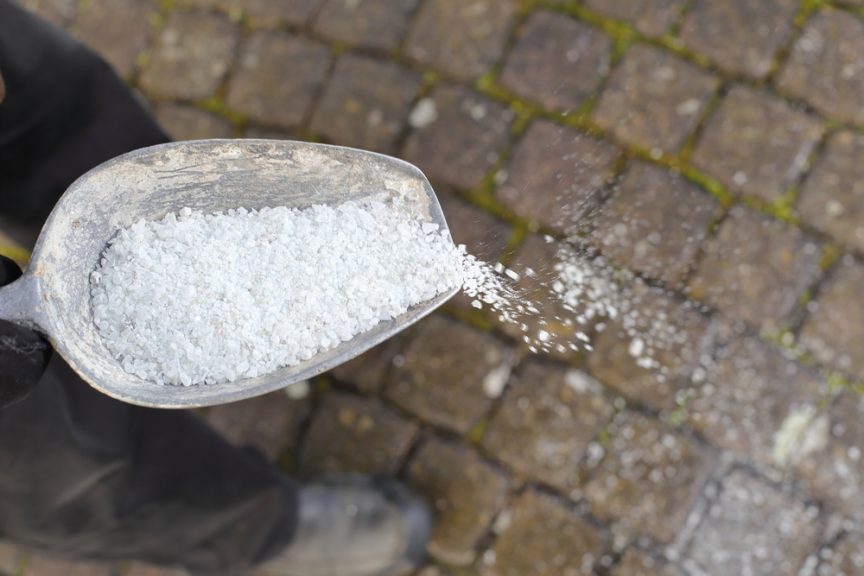Rising salt levels in Minnesota underscore the need for environmentally friendly alternatives to outdated dust control solutions.
When chlorides make their way into lakes, rivers, and groundwater, they’re extremely difficult to remove. That’s why officials at the Minnesota Pollution Control Agency (MPCA) are worried by recent water monitoring data that shows that 50 bodies of water around the state have such a high chloride concentration that they’re now toxic to fish and other aquatic life.
In fact, the concentration of chloride (salt) in the state’s water supply has been on the rise for nearly 35 years. The Minnesota, St. Croix, and Mississippi rivers — part of the North Star State’s 221 miles of rivers and 1,400 acres of lakes — have seen significant spikes. For the Land of 10,000 Lakes, heightened chloride toxicity is a major challenge.
While road salt is one of the most well-known culprits behind rising chloride levels, there are other major causes. Fertilizer and water softener salt are common sources, but it’s important to remember the impact that chloride-based dust control methods play in this crisis. Thankfully, community stakeholders can turn to environmentally friendly dust control products that can get the job done without compromising sustainability.
The Dangers of Chlorides
Chlorides pose a significant threat to fragile ecosystems. Once chloride concentration surpasses a given level, the chemical can harm and even kill fish, invertebrates, and plants. Because the only way to completely desalinate bodies of water is through reverse osmosis — a time-consuming and expensive process — it’s incumbent upon authorities to do what they can to keep these concentrations down in the first place.
Beyond the natural environment, chlorides can pose a risk to nearby communities’ drinking water. In fact, the MPCA reported that 16% of monitoring wells in shallow sand and gravel aquifers around the Twin Cities have raised chloride levels. Water that contains too much chloride can corrode lead and copper pipes, posing issues to those who drink it.
When applied to roads, chlorides also present an issue for community infrastructure and vehicles. The chemical is damaging to metal, which can lead to safety hazards with bridges and mandate costly repairs. Plus, it can cause vehicle wiring, suspension systems, and brakes to deteriorate from the bottom up, making driving dangerous for those using heavily salted roads.
The Importance of Safer Dust Control
Keeping in mind the dangers of chloride, community stakeholders should consider how they can invest in safer dust control methods. Chlorides may seem like an inexpensive option at first, but because they’re less effective than more sophisticated alternatives, they require repeated applications and ongoing maintenance. This causes the total cost of a given project or initiative to rise, rendering chlorides an unwise investment — especially for communities concerned about environmental protection.
Instead, key decision-makers should look to sustainable, chemically advanced dust control products. Safer, more effective alternatives can save communities resources in the long run, preserve local ecosystems, and protect drivers, their vehicles, and the infrastructure they use every day.
Working with the Dust Control Experts
For stakeholders looking for effective, long-lasting dust control, chlorides just aren’t worth the risk. By investing in new alternatives to old technology, it’s possible to control dust without adverse effects on health, infrastructure, and ecosystems.
Midwest Industrial Supply, Inc. offers industry-leading dust control products, turn-key application programs, and custom managed service programs to get the job done. For example, our EnviroKleen® line of patented products were the first Synthetic Organic Dust Control® products on the market. To this day, they leverage a safe, biodegradable binder system that captures and binds surface aggregate and fines without damaging roadways or corroding the underside of vehicles.
If you’re interested in transforming your dust control strategy and protecting your bottom line, reach out to the team at Midwest today. Our experts can work with you to develop a program that fits your specific needs, handling everything from site analysis and application to ongoing maintenance and consultation. For dust control backed by 40 years of expertise, we have you covered.


